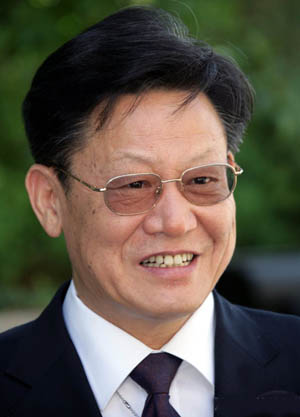| Home / China / Features | Tools: Save | Print | E-mail | Most Read |
| Sha Zukang: From Farmer to Diplomat |
| Adjust font size: |
Sha’s diplomatic style is distinctly different from other Chinese diplomats who have laid an impression of being gentle and polite in the minds of many Western nations, evidenced by US newspapers describing him as “surprisingly frank.” He said: “Having grown up in a rural area, my speech and deportment are still like a farmer. I like to speak frankly and directly, and don’t like beating about the bush.” When carrying a joke one day, he asked UN Secretary-General Ban Ki-moon whether he should change his character. The Secretary-General answered him, “Please don’t. It is just what the UN needs.” A recent issue of News Magazine presented a profile of Sha Zukang, touching on his childhood, college life, and family. Humble beginnings Sha Zukang was born in Because of hunger, Sha and his younger brother had to decide whose turn it was to scrape the bottom of the porridge pot each day. Although his life was difficult, Sha was always optimistic. “The sun will shine in front of my home one day,” he said to himself. In 1962, Sha attended high school. His interest in studying English was inspired by his teacher Shi Fengyun, who had been an interpreter for American pilots during the war. Besides being very strict, Mrs. Shi selected some fifteen students, including Sha, to form an extra-curricular English learning group. Mrs. Shi gave the group one or two-hour tutorials even during winter and summer vacations. Thanks to the teacher’s efforts, Sha laid a solid foundation in English learning. On the morning of the day in 1965 when Sha Zukang took the college entrance exam, he only had a lump of pumpkin for breakfast. But, starvation didn’t stop him from doing well on the exam, and he was accepted into the English Department of prestigious His “adoptive mother” The Cultural Revolution (1966-76) broke out just eight months after Sha began college. Cai Jinxiu, Sha’s classmate, recalled, “This movement seemed to have nothing to do with Sha. He concentrated all his efforts on study. He read whatever books were criticized by society.” Mrs. It was Mrs. Jiang who put Sha on the path to becoming a diplomat. Before graduating from the university, the Central Military Committee and the Ministry of Foreign Affairs (MFA) both wanted to recruit Sha. To decide which unit he should choose, Sha had a long conversation with Mrs. Jiang. Sha said he longed to be a soldier. But Mrs. Jiang told him that the MFA was short of talent as it’s a new department established after the founding of the People’s Republic of After he graduated, Sha kept in contact with Mrs Jiang. Whenever he was in Family life Like thousands of other ordinary people, Sha plays the part of a son, a brother, a husband, a father, and so much more in his family. However, it is difficult to find time for his family because of his career. Sha’s mother passed away in 2000. She called Sha one week before her death. Sha only answered a few words before hung up because he was attending an international conference. When Sha heard the news of his mother’s death one week later, he was terribly upset. Sha Yiying, his younger sister, said, “My brother spread a straw mat in the room where our mother’s body was kept and he stayed in that room for three days.” Compared to his four siblings, Sha is the only child to have gone to high school and college, because their parents couldn’t afford to education of all the children. Sha’s younger siblings are still living in Yixing, working as farmers or fruit paddlers. But they are all leading happy and self-satisfactory lives thanks to their own efforts. Sha now lives in a “diplomatic family” because his wife and son are also engaged in In 1973, right after his marriage to wife Liu Jinfeng, Sha was dispatched to A “chivalrous” diplomat Being a diplomat, Sha has acted as a man of justice just like characters in the martial arts novels that he liked to read when he was in high school. Sha’s hard-line remarks for the sake of the country’s interests always leave a deep impression on global media. During an interview by a BBC radio program in 2006, he told the Sha said in a speech, “Chivalry and justice of personal character should be reflected in diplomatic works. Diplomats of country as big as It has not been an easy journey for Sha, as he recalls, “My 37-year diplomatic career didn’t run smoothly. My character determines I have to meet many setbacks in my life. I like to express my own opinion straightforwardly and never please others’ thoughts.” Nonetheless, his classmate Cai Jinxiu said, “Sha’s current life is really a miracle considering his character of being extremely frank.” Sha Zukang styled himself a “farmer diplomat.” He often said to his friends that when he retires he would settle in his hometown to spend his old age being a farmer. (China.org.cn by |
| Tools: Save | Print | E-mail | Most Read |
 |
| Related Stories |
|

